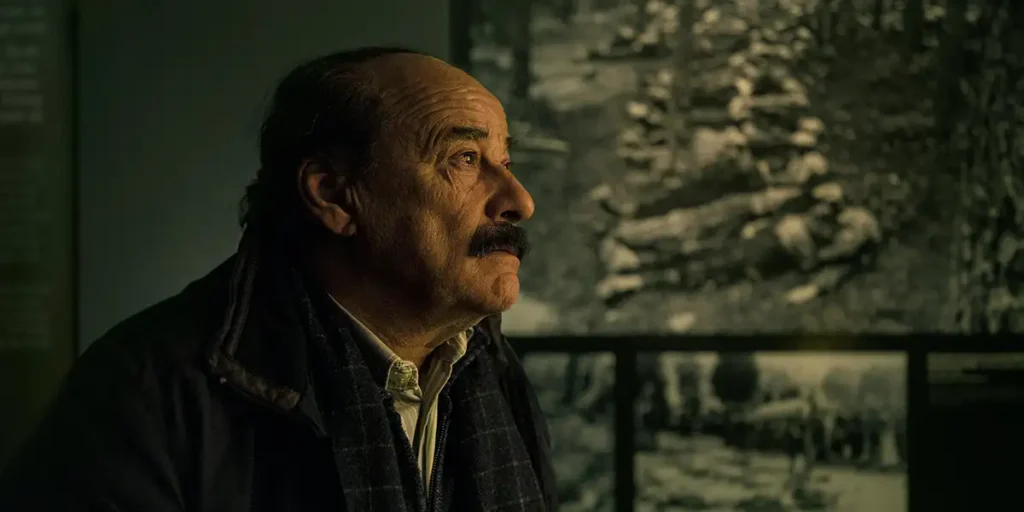Marco, The Invented Truth has a juicy story and a terrific lead performance, but lacks the depth required to interrogate the true story behind it.
Directors: Aitor Arregi and Jon Garaño
Genre: Drama
Run Time: 101′
BFI London Film Festival Screening: October 12-14, 2024
U.S. Release Date: TBA
U.K. Release Date: TBA
The western world may purport to be a meritocracy, but sometimes there’s nothing like a little white lie to help a person get ahead. Anyone can embellish a CV to land a job, but there have to be limits on how far a person will take a lie before you have to call their bluff. Enric Marco built a career on his story as an advocate for deported Spanish survivor of concentration camps during the Second World War, claiming to be one himself. Tragic as that story is, how does one verify such a claim?
When someone finally does question Marco’s background, directors Jon Garaño and Aitor Arregi milk plenty of tension out of watching a man sweat in Marco, The Invented Truth, even if they never fully explore his reasons for putting himself in this precarious position.
Films based on impostors are always compelling in evoking the tension between truth and reality. Marco, The Invented Truth opens with the truth, in the form of a brief opening backstory and archival footage of a concentration camp. Despite the cordial relationship between Hitler and Franco, 9,000 Spaniards ended up in Nazi concentration camps. Enric Marco was not one of these. His lie is underlined by the sight of a film clapperboard in the first shot of new footage, as if the editor neglected to cut the first few seconds of film. Garaño and Arregi’s film is playful in its methods, using the artifice of film to reflect and attack the artifice that Marco perpetuated for so long.
Marco (Eduard Fernández) visits the camp of Flossenbürg in Austria to obtain official certification of his imprisonment there during the war. When his record can’t be found, no-one bats an eyelid. The records are old and long, and plenty could have been lost in the intervening years. Marco exploited the goodwill of researchers, advocates and policymakers to evade the truth, namely that he went to Germany voluntarily to avoid criminal charges back in Spain.
For the first act of Marco, The Invented Truth, the camera watches Marco with impatience, as he gives a talk to a school history class, lobbies government officials, and negotiates the leading role Spain would play in the next commemoration of the liberation of the Marthausen concentration camp, in which he naturally claims to have been imprisoned. The humility with which Marco presents himself and his story is endearing, which makes the tension of waiting for his inevitable downfall all the more compelling.

However, before we get to that downfall, Garaño and Arregi feel impelled to explain how Marco came to his position of trust as a lobbyist for the survivors that the Spanish government refused to acknowledge after the war. Marco, The Invented Truth’s script is a busy one, darting back and forth between the unfolding scandal and 2005, and various interludes at the turn of the millennium, even going back to 1969 at one point, complete with Fernández in a bad hair dye job playing a man in his late 20s.
Marco, The Invented Truth periodically tries to sell itself as a more ambitious tale than it really is, with the time jumps aiming for a greater sense of import. However, the film works best in its quieter moments, when Marco is being pursued by historian Benito Bermejo (Chani Martín) about inconsistencies in his story. In these moments, with minimal directorial flourish, Marco, The Invented Truth invokes the best of these false narrative stories, namely Billy Ray’s tale of corrupted journalism, Shattered Glass.
With the commemoration of Marthausen approaching, and Spanish government involvement on the line, Marco, The Invented Truth scarcely takes its eyes off Fernández’s wearied face. He is a terrific asset in the lead role, at once inviting sympathy as stress builds all around him, while also guarding Marco’s reasoning for his actions. The problem is that Garaño, Arregi and their co-writers are unable to offer any more insight into Marco’s actions either. Unlike the subject of Shattered Glass, the character of Marco is never sufficiently interrogated by the people telling his story.
Until his death in 2022, Marco continued to rail against perceived ill-treatment by historians and the media, despite the evidence that Bermejo uncovered, but he never offered any rebuttal to the evidence other than bluster and a victimhood complex. It makes for a compelling tale of a liar being exposed, but the reasons for those lies never come to light. The conflict etched in Fernández’s face keeps us watching until the end, but Marco, The Invented Truth isn’t able to uncover the truth behind ‘the invented truth’.
Marco, the Invented Truth will be screened at the BFI London Film Festival on October 12-14, 2024. Read our list of 30 movies to watch at the 2024 BFI London Film Festival!

